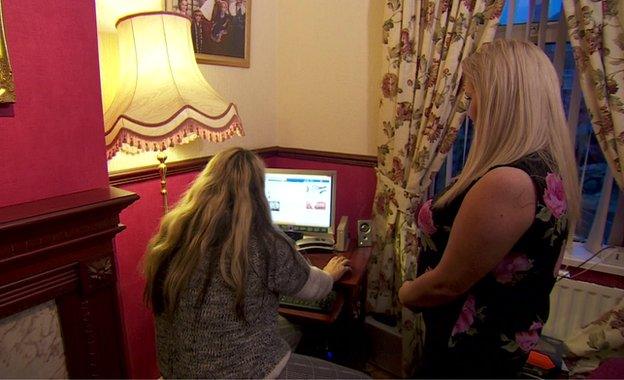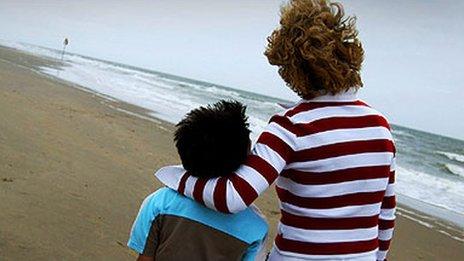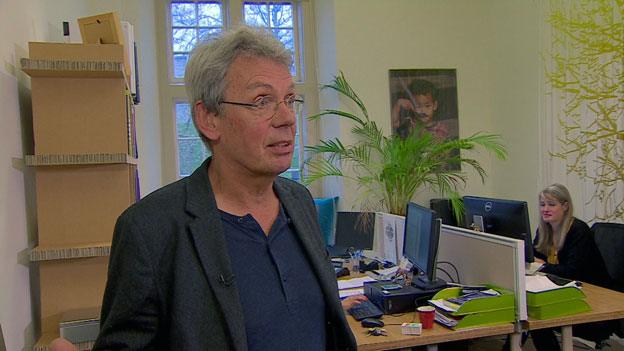Can you stop a paedophile before they even start?
- Published

Between 1-2% of men are thought to be paedophiles. Some become dangerous criminals preying on children, while others never act on their feelings. However views are divided on how and when to intervene in order to protect children.
In a terraced house in Barrow-in Furness, Cumbria, two mothers are looking intently at a computer screen.
They are studying pictures of convicted paedophiles. The two women scan local newspapers and the internet for information about court cases, then update their website. Their mission is to name and shame men convicted of abusing children.
"I think it is really important that children are protected from predatory paedophiles," says Keilly Devlin, a mother of three.
"An innocent child's life is more important to be kept sacred and safe than a paedophile. I think that paedophiles do need to be named and shamed and people do need to know where they are living locally so we can keep our children away."
Their group Communities Against Paedophiles South Lakes claims to have 5,000 members. However, their activities are discouraged by the police.
"Whilst we appreciate that members of the public may have concerns regarding convicted sexual offenders in the community, we would discourage naming and shaming groups," a spokesperson for Cumbria Constabulary says.
"The reason for this is that this presents a risk of misinformation, which can deter the work police and partner agencies conduct on a daily basis. It can also be counter-productive as these type of groups can inadvertently send offenders further underground."
So who are the people who abuse children? And how can children best be protected?
Between 1% and 2% of men are thought to be paedophiles. There are many female paedophiles but the vast majority are men.

More from the Magazine

By its very nature the true picture of child abuse is unclear. But with women perpetrators it's even more so. Convictions are thin on the ground and some believe the issue is an unhelpful distraction from the bigger problem.
Experts agree that women commit only a fraction of child sexual abuse but so much is hidden that it's difficult to be accurate. An influential study in the US in the 1980s suggested 20% of all offences against boys and 5% against girls were by women.
In 2005, the NSPCC raised concerns about how disbelief of female paedophiles was hindering detection. Its report said child protection professionals too often met allegations of abuse by females with incredulity, dismissing them as fabrication and allowing women to continue to offend.

One study, by Professor Tamara Turner-Moore at Leeds Beckett University, suggests up to 10% of men have sexual thoughts about children at some stage in their lives.
Researchers also say paedophiles are most likely to offend when their self-esteem is low and their stress levels are high.
In a room above a café in Cumbria sits Eddie. This is not his real name, but he agreed to meet on condition of anonymity. He is a convicted paedophile. He was jailed for nine years for serious sexual offences against a child. Now he says he is on a path to rehabilitation.
"I feel really guilty yes. It's unacceptable what I did," he says.
"At the time I thought it was OK. Of course it's not. You can't go out and do something like that to someone who is basically harmless and think it's OK you can get away with it."
Eddie says the abuse took place when his drinking was spiralling out of control.
"I don't know why it happened. I can't just blame the drink. There must have been something there, a feeling for children. I can't understand it now because I can't understand why I did it."
Eddie (not his real name): "If Circles hadn't been there, things would possibly have started over again"
On release from prison, Eddie was helped by Circles UK. Working with probation officers, volunteers form a "circle of accountability and support" around a newly released sex offender, who is known as the "core member" of the circle.
The aim is to help him resettle in the community. It says it has a high rate of success in preventing reoffending. It has received government funding to form 74 more circles working with offenders across England.
Zak, a Circles volunteer in Cumbria, explains how it works:
"Because they are feeling totally isolated from the community and very lonely, they have a high risk of reoffending. What a circle does is supporting the role of watchdog.
"If the offender indicates some kind of risk to the community we inform the co-ordinator and address them to the appropriate agencies. By helping them by challenging their behaviour and risky thoughts we can prevent them reoffend and prevent another victim being recreated."
Circles UK is one of the few organisations that tries to protect children by working directly with paedophiles.
Another is a confidential helpline - Stop It Now! - which aims to encourage adult abusers to seek therapy and help. It also advises families where someone is showing worrying sexual behaviour.
"We need to intervene earlier in order to better protect children," says Donald Findlater, Director of Research and Development at Lucy Faithfull Foundation, which runs the helpline.
Largely funded by the Ministry of Justice and the Home Office it was founded 12 years ago and now receives some 700 calls per month.
Of the callers, 48% have already committed an offence and 8% were men troubled by their sexual thoughts who had not yet offended, according to an evaluation last year by the National Centre for Social Research.
"There is so much more we can do to prevent child sexual abuse," says Findlater. "Education for parents is grossly inadequate - there is much, much more they can do to keep their children safe.
"However one of the problems is that some of the help is not available until someone has broken the law - surely it is better to make help available before a child has been harmed?"
Findlater advised Dutch campaigners in setting up their own helpline. However in the Netherlands they have gone much further in encouraging men to call and seek help.
An advertisement on national television shows a man wrapped in a towel, shaving, with a voiceover saying: "I'm Frank. I'm a paedophile."
As he cycles to work clutching a brown leather bag, the voiceover continues: "My paedophilia is treatable. I do not have contact with children." The advert ends with the helpline phone number. There are also billboards posted in some cities.
On the day we visited the helpline, anyone calling the number would have got through to a small modern office in an old building in the centre of the historic university city of Leiden.
A psychology student sat at a neat desk by a computer screen and a pot plant, waiting for the phone to ring.
Jules Mulder, the director the Dutch helpline, says he wants to encourage men to seek help before they have contact with children.

"What we try to do is be more permissive to being paedophilic. These people are in society - they are among us. It is much better for them and us if you just accept this fact - you can help them to live a normal life. It makes society safer if you acknowledge the problem.
"By helping the men who do this before they do, it is the best thing to do. If you can really understand that, we can help society get safer. That's what we try to get across to people. Everybody wants to have less child abuse."
In a drab industrial estate in the city of Utrecht is a squat modern building. From the outside it looks like an office or small workshop. But it is a clinic for sex offenders. It is to here that the callers to the helpline are referred.
Inside, by a leafy courtyard, we meet one of the therapists, Annemarie Determan. Her job is to help sex offenders change their behaviour. Does therapy work?
"Yes all the time," she says. "Treatment can take a long time. Sometimes it is five conversations but mostly it is over a year or two years. I have seen people motivated not to download child porn, or groom children, or to change their lives, not going to places where children are. Most of them are capable of changing.
"There are some who have feelings but are not paedophilic. They have problems with emotions or with coping styles so they feel frustrating and they end up downloading child porn. Then I teach them something else about how to cope with their emotions or frustrations or another way not downloading child porn."
If you have been affected, the following organisations can help: NSPCC charity, external specialises in child protection. National Association for People Abused in Childhood, external offers support, advice and guidance to adult survivors of any form of childhood abuse. Childline, external is a private and confidential service for children and young people up to the age of 19. The Children's Society, external works to support vulnerable children in England and Wales.
Other help: Stop it Now, external is a is a child sexual abuse prevention campaign in the UK and Ireland. Circles UK, external aims to reduce sexual reoffending by working directly with paedophiles through networks of community volunteers
Subscribe to the BBC News Magazine's email newsletter to get articles sent to your inbox.